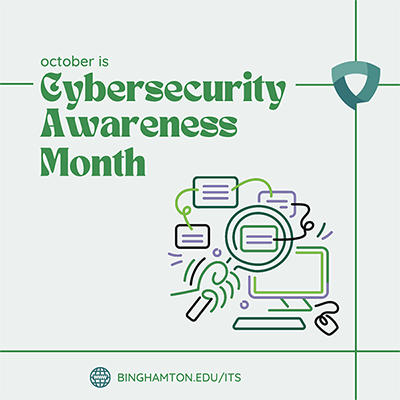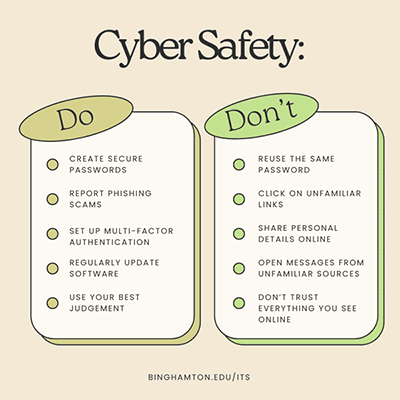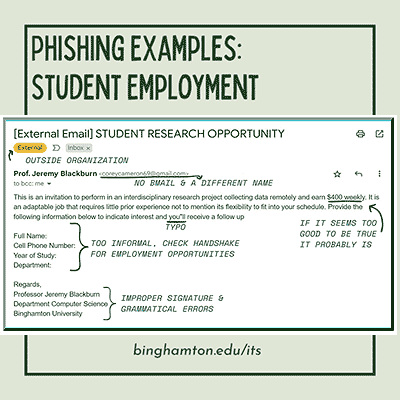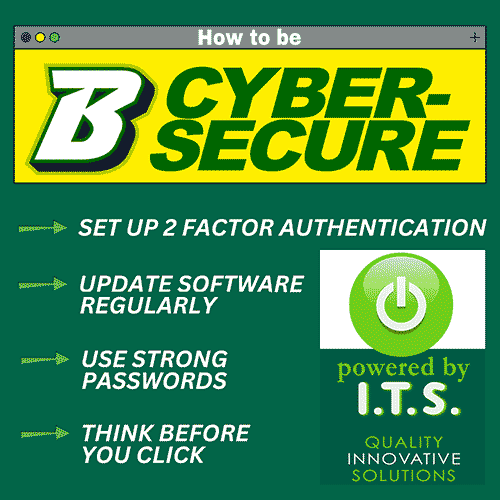
October is Cyber Security Awareness Month!
There are many ways to stay safe on the internet but it is up to YOU to remain vigilant and protect yourself! Read on for recommended actions to protect yourself:
Apply the DO's for Online Security:
1. DO use 2-factor authentication: Add an extra layer of security beyond your username and password. Learn more about 2FA
2. DO run malware and virus protection: Keep your devices secure by using up-to-date browsers, virus protection, malware detection, software, and apps. Regularly check for updates for peace of mind. Learn more about malware and virus protection.
3. DO backup your work: Protect your valuable data by regularly creating backups. It's an extra layer of security and peace of mind. Learn more about how to backup your data.
4. DO protect your credentials: Binghamton University or any reputable organization will NEVER SEND EMAILS requesting your usernames, passwords, or other personal information. Contact the ITS Help Desk if you think you've been scammed. Change your password...
MOST OF ALL - Stay in tune with the latest advice and assurance to avoid phishing scams by reviewing this ITS page and following @BinghamtonITS on Instagram.

Phishing is the practice of reaching out to unsuspecting users via deceptively official looking avenues, most commonly email, to extract personal information for illicit gain.
These fraudulent messages may impersonate:
- Banks
- Police agencies
- Friends/Family
- Coworkers
- Student job opportunities
- Other legitimate entities.
Information requested:
- Credit Card Numbers
- Social Security Numbers
- ATM PIN numbers
- Passwords
- Other unique personal information.
Recipients are typically asked to provide this information via email or by visiting official-looking websites, with threats of service discontinuation for non-compliance.
Recent phishing examples and cyber security information security info.

Helpful Resources and Tips to Avoid Phishing Scams
Stay Informed
Google Help: How Phishing Works, Information Phishing Sites May Ask For and Reporting Phishing Sites
Gmail (Bmail) Help: Avoid Phishing Attacks
Key Tips for Your Safety
Be Cautious with Suspicious Emails: When you receive an email asking for personal information, follow these steps:
- Don't click any links or provide personal information until you've verified the email's legitimacy.
- If the sender has a Bmail address, report the Bmail abuse to Google and/or contact the Help Desk.
When you get an email that looks suspicious, here are a few things to check for:
- Check that the email address and the sender name match.
- Check if the email is authenticated.
- Hover over links before clicking to confirm their destination. Be cautious of misleading URLs.
- Inspect message headers to ensure the "from" header isn't suspicious.
Secure Your Gmail (Bmail) Account: If you suspect your Gmail (Bmail) account has been compromised, take these steps:
- Recover your compromised account before opening or sending any other emails.
If issues persist, change your password and seek support from the IT Self Help page or contact the Help Desk at 607-777-6420.
Stay ahead of the curve by doing these main things & watching out for the most recent scam emails.
